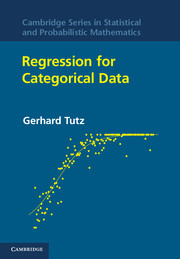Book contents
- Frontmatter
- Contents
- Preface
- 1 Introduction
- 2 Binary Regression: The Logit Model
- 3 Generalized Linear Models
- 4 Modeling of Binary Data
- 5 Alternative Binary Regression Models
- 6 Regularization and Variable Selection for Parametric Models
- 7 Regression Analysis of Count Data
- 8 Multinomial Response Models
- 9 Ordinal Response Models
- 10 Semi- and Non-Parametric Generalized Regression
- 11 Tree-Based Methods
- 12 The Analysis of Contingency Tables: Log-Linear and Graphical Models
- 13 Multivariate Response Models
- 14 Random Effects Models and Finite Mixtures
- 15 Prediction and Classification
- A Distributions
- B Some Basic Tools
- C Constrained Estimation
- D Kullback-Leibler Distance and Information-Based Criteria of Model Fit
- E Numerical Integration and Tools for Random Effects Modeling
- List of Examples
- Bibliography
- Author Index
- Subject Index
Preface
Published online by Cambridge University Press: 05 June 2012
- Frontmatter
- Contents
- Preface
- 1 Introduction
- 2 Binary Regression: The Logit Model
- 3 Generalized Linear Models
- 4 Modeling of Binary Data
- 5 Alternative Binary Regression Models
- 6 Regularization and Variable Selection for Parametric Models
- 7 Regression Analysis of Count Data
- 8 Multinomial Response Models
- 9 Ordinal Response Models
- 10 Semi- and Non-Parametric Generalized Regression
- 11 Tree-Based Methods
- 12 The Analysis of Contingency Tables: Log-Linear and Graphical Models
- 13 Multivariate Response Models
- 14 Random Effects Models and Finite Mixtures
- 15 Prediction and Classification
- A Distributions
- B Some Basic Tools
- C Constrained Estimation
- D Kullback-Leibler Distance and Information-Based Criteria of Model Fit
- E Numerical Integration and Tools for Random Effects Modeling
- List of Examples
- Bibliography
- Author Index
- Subject Index
Summary
The focus of this book is on applied structured regression modeling for categorical data. Therefore, it is concerned with the traditional problems of regression analysis: finding a parsimonious but adequate model for the relationship between response and explanatory variables, quantifying the relationship, selecting the influential variables, and predicting the response given explanatory variables.
The objective of the book is to introduce basic and advanced concepts of categorical regressions with the focus on the structuring constituents of regressions. The term “categorical” is understood in a wider sense, including also count data. Unlike other texts on categorical data analysis, a classical analysis of contingency tables in terms of association analysis is considered only briefly. For most contingency tables that will be considered as examples, one or more of the involved variables will be treated as the response. With the focus on regression modeling, the generalized linear model is used as a unifying framework whenever possible. In particular, parametric models are treated within this framework.
In addition to standard methods like the logit and probit models and their extensions to multivariate settings, more recent developments in flexible and high-dimensional regressions are included. Flexible or non-parametric regressions allow the weakening of the assumptions on the structuring of the predictor and yield fits that are closer to the data. High-dimensional regression has been driven by the advance of quantitative genetics with its thousands of measurements. The challenge, for example in gene expression data, is in the dimensions of the datasets. The data to be analyzed have the unusual feature that the number of variables is much higher than the number of cases.
Information
- Type
- Chapter
- Information
- Regression for Categorical Data , pp. ix - xPublisher: Cambridge University PressPrint publication year: 2011
